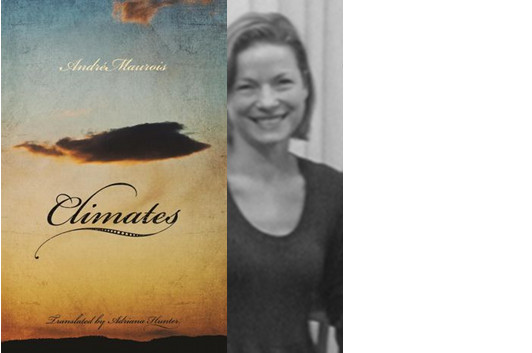Adriana Hunter: Discovering Fresh Climates

photo: Peirene Press
Over the last decade or so, Adriana Hunter has become one of the leading English-language translators of contemporary French literature, but with Climates, she’s taken on something new, or rather something not so new—André Maurois wrote Climats in the late 1920s, and it was a bestselling sensation not just in France but throughout Europe when it was first published. (At the time, it was brought to the United States as Atmosphere of Love; in the 1980s, a new translation appeared under the title The Climates of Love.) In this guest essay, Hunter talks about the challenges she faced in making a novel that’s nearly 85 years old “fresher” while staying true to the language conventions of the era.
My “way in†to translating any book is its narrative voice. I hear a voice and get a feel for its tone, rhythms and word patterns. André Maurois’s Climates of Love was a little more complicated because there are two narrators, Philippe and Isabelle, as well as less formal extracts from Philippe’s private notebooks and from letters. On top of this, there is the question of period: Climates was written in the 1920s, and my publisher had asked me to update the prose, making it feel fresher but without anachronisms (infatuation and jealousy probably feel the same now as they did a century ago, but other sensibilities and constraints in the book are very specific to the characters’ era, and I was keen to respect these).
Having previously translated only contemporary writers, I found the question of period and anachronism an enjoyable new challenge. In Maurois’s original, even the dialogue can sound like writerly prose whereas in a lot of contemporary fiction even the prose sounds like colloquial dialogue. I wanted to strike a balance, making the prose accessible but still with the poise and restraint of another era. I hope this sentence from the first page illustrates this:
“That is the charm of new acquaintances: the hope that, in their eyes and by denying the truth, we can transform a past that we wish had been happier.â€
Which might have sounded more natural as:
“That’s what’s nice about meeting new people, you can always hope that—if you deny the truth yourself—you can make them believe your past was happier than it was.â€
This is a perfectly valid translation, but look at those modern contractions (that’s what’s), those muscular dashes around a clause and that gangling repetition of “wasâ€. It just doesn’t sound like someone from Philippe’s background in the 1920s.
On the other hand, I introduced contractions and colloquialisms into dialogue to make the characters come alive. Even here, though, there are distinctions between them: in Chapter XX, I have the formal Philippe ask his cousin Renée “Have you never thought of marrying?†when a different character might have used the contraction “haven’t†(“Haven’t you ever thought of marrying?â€), but I do use contractions in Renée’s reply: “I’m independent, I’ve never met a man I really liked.†The fact that I “make†Philippe speak in a different way to Renée is my response to their different characters, it is how I hear them.
I use the same technique with the different narrative voices in the book. I could be analytical and plan a different style for each voice before starting the translation, but I work the other way around: I go straight into translating the material, trusting my spontaneous response to the original book’s voices. Many writers say books and characters write themselves and, miraculously, the same thing seems to happen with translation: the different voices emerge and establish their identity. When I edit my work I can choose to highlight this effect by ensuring two different voices don’t share any syntactical tics or unusual word choices, but the groundwork is just a gut reaction.
Another consideration with this book (a first for me) is that it had already been translated into English. I made a point of not looking at this existing translation. I wanted to avoid the temptation of peeking at how they had coped with difficult passages, and I certainly didn’t want this version to influence mine in one of two ways: I might—consciously or not—plagiarize it or, conversely, I might stray from my spontaneous response to Maurois’s text in order not to copy it. I needed to approach Maurois’s book as I would any other translation, as a piece of French writing, not as one French text and one English one that I had to splice together along with my own version to form a bizarre multi-parented love-child!
Climates of Love was a pleasure to translate, and I really hope I’ll be offered the opportunity to work on more classics like this…
10 December 2012 | in translation |

 Our Endless and Proper Work is my new book with Belt Publishing about starting (and sticking to) a productive writing practice.
Our Endless and Proper Work is my new book with Belt Publishing about starting (and sticking to) a productive writing practice. 
